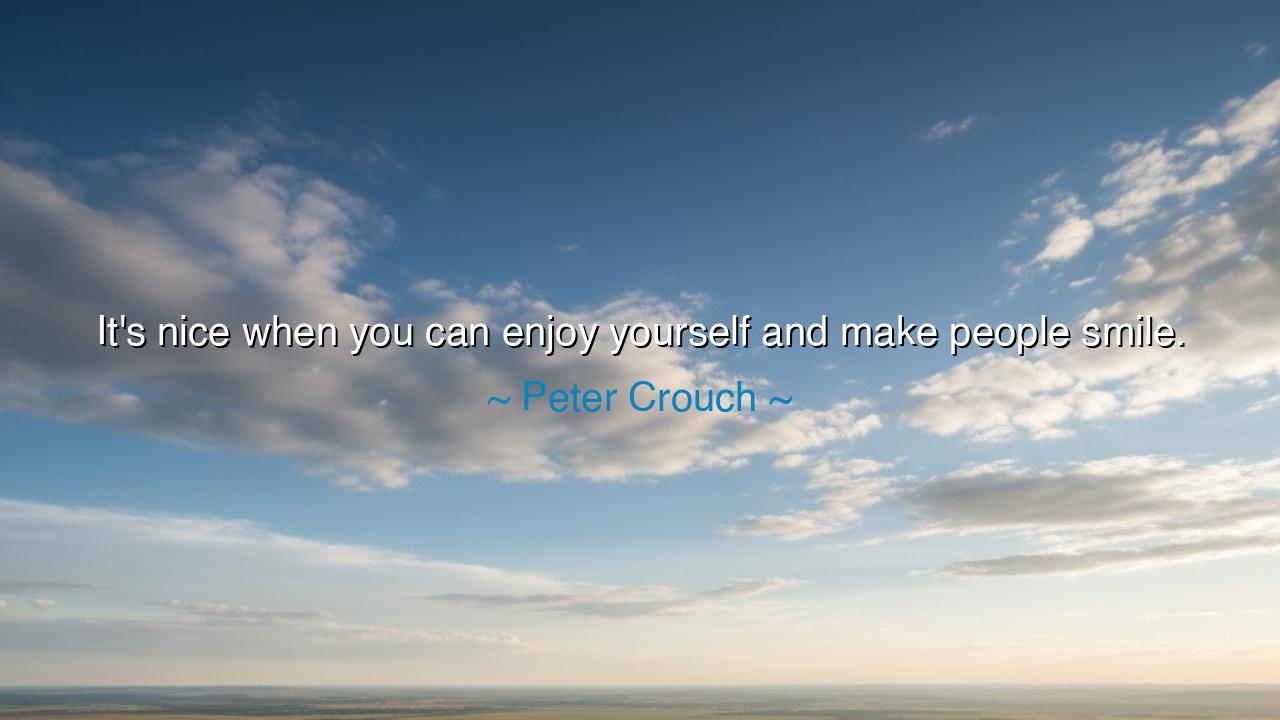
It's nice when you can enjoy yourself and make people smile.






Hear now the words of Peter Crouch, the towering striker whose presence once commanded the football fields of England: “It’s nice when you can enjoy yourself and make people smile.” Simple though it may seem, within this phrase lies a teaching as timeless as the wisdom of the ancients—that true joy is not complete unless it is shared, and that the highest form of pleasure is the kind that lifts others with you.
For to enjoy yourself is good, but to make people smile is greater still. The first satisfies the self, but the second binds the self to the community. Crouch, known not only for his goals but also for his humor and humility, revealed through this thought that life’s victories, whether small or great, shine brightest when they kindle happiness in those around us. This echoes the words of sages long gone: that joy hoarded diminishes, but joy given multiplies.
Consider the ancient Greeks, who honored not only the champions of the Olympic Games, but also those who entertained the people through theatre and song. The poet who made the crowd laugh, the musician whose lyre brought tears, was as beloved as the athlete who won the wreath. Why? Because to make people smile was to heal hearts, to lighten burdens, to remind all that life’s beauty is not only in toil but in shared delight. In the eyes of the ancients, the man who gave laughter gave a gift greater than gold.
History shows us another echo in the figure of Abraham Lincoln. In the darkest days of the American Civil War, when sorrow hung heavy over the land, Lincoln was known to tell stories and jokes to those around him. Some thought it unbecoming of a president in wartime. Yet he understood that even in the gravest moments, a smile could give weary souls the strength to endure. Like Crouch on the field, Lincoln knew that lifting others with lightness was itself a kind of leadership, a kind of victory.
Crouch’s words carry yet another depth: that joy must be authentic. He did not speak of mocking others, or of hollow entertainment, but of the genuine pleasure of enjoying yourself in a way that naturally spreads happiness. When one is sincere, when one’s laughter springs from the heart, it becomes contagious. Such joy is not forced, nor performed, but flows freely, touching all who are near. The wisdom here is that the best way to make people smile is to be truly alive yourself.
The lesson, then, is clear: cultivate joy within, and let it overflow. Do not chase pleasure only for yourself, nor labor under the illusion that success alone will satisfy. Instead, seek to live in such a way that your very presence brings warmth. Your smile, your humor, your authenticity, may be the medicine another soul longs for. And in giving joy, you will find your own deepened.
Therefore, beloved listener, make this your daily practice: take delight in the small things, and share that delight with others. Laugh freely, speak kindly, carry a light spirit into dark places. Whether on the stage, on the field, or in the quiet company of friends and family, let your joy ripple outward. For as Crouch reminds us, it is not only nice—it is noble—when you can enjoy yourself and make people smile.






AAdministratorAdministrator
Welcome, honored guests. Please leave a comment, we will respond soon